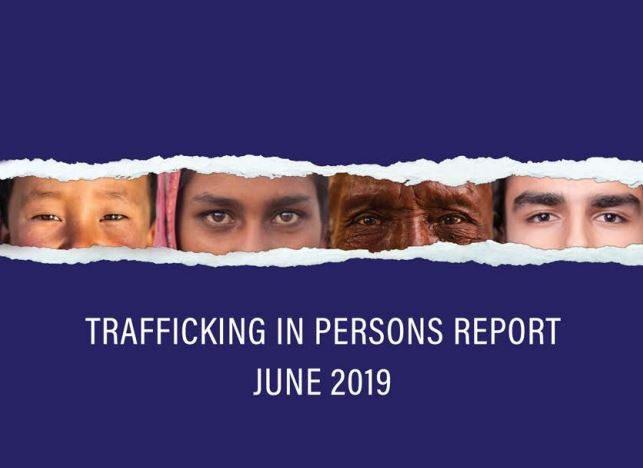10 July 2019 – On 20 June, the United States (US) Department of State (DoS) released its 2019 Trafficking in Persons (TIP) Report, which assesses the actions individual countries are taking to combat human trafficking. Countries are rated on their efforts and progress according to a four-‘tier’ system, with Tier 1 being the highest ranking. In the 2019 report, Bahrain remained on Tier 1 for the second consecutive year after having been bumped up from Tier 2 by DoS in 2018 – indicating the kingdom “fully meets the minimum standards for the elimination of trafficking” and “continued to demonstrate serious and sustained efforts.” Americans for Democracy & Human Rights in Bahrain (ADHRB) is deeply disappointed with the State Department’s decision to keep Bahrain at Tier 1 given the continuing incidences of forced labor and trafficking in Bahrain. We further emphasize that the measures taken by the kingdom do not offer significant prospect for improvement.
The 2019 report touts Bahrain’s increase in trafficking convictions and the ability of workers to sponsor themselves through the “flexi permit” program as justification for its Tier 1 status. Yet the report highlights several areas where Bahrain has ultimately failed – specifically by neglecting to treat indicators of forced labor as potential trafficking crimes. The Bahraini government does not regularly investigate cases of unpaid or withheld wages or passport confiscation by employers, and infrequently investigates, prosecutes, or convicts perpetrators of forced labor.
The report noted that “some employers subject migrant workers to forced labor in Bahrain” and signs included “passport retention, strict confinement, contract substitution, non-payment of wages, debt bondage, threats or intimidation, and physical or sexual abuse.” While the government of Bahrain originally planned to institute a wage protection system in January 2018, its implementation has now been delayed until September 2019 and, once implemented, will take over a year until all migrant workers are covered by it. Additionally, there are serious questions about how the system will flag wage theft. The consequences for employers who do not comply with the measure are unclear.
While the flexi permit program is showcased in the report as an anti-trafficking accomplishment, the program can actually exclude more workers from protections and has strong limitations. There are no contracts to ensure wages and working conditions are not exploitative, and workers have to pay extraordinary fees that can lead to debt bondage. During the reporting period, the fees for the one- or two-year permits actually increased. The State Department report further highlighted concerns from NGOs and labor rights organizations that the permits “created a system of day laborers, overly shifted legal responsibility to the employees, and generated economic coercion given the associated cost of eligibility.” The program also reduces employer liability for abuses, in practice. At present, there is no evidence that the flexi program offers any additional protection or legal redress to permit holders, and it appears that a flexi permit holder will be unable to pursue a labor or TIP case against an employer.
On top of the specific concerns related to forced labor and trafficking in Bahrain, there is the broader issue of the kingdom’s lack of openness to international organizations. The ability for civil society to operate is indicative of greater access to fundamental freedoms, but Bahrain routinely denies access to international NGOs, human rights organizations, and United Nations (UN) Special Rapporteurs. The kingdom has also clamped down domestically, with all major opposition political societies forcibly dissolved and the last independent newspaper shuttered. This clampdown on civic space directly undermines civil society’s ability to independently monitor and track human trafficking and related abuses, and for migrant workers themselves to report exploitation, raising further concerns about the veracity of government claims accepted by the State Department in the TIP Report.
The Tier 1 designation for Bahrain in the 2019 Trafficking in Persons Report is neither appropriate nor earned, and no country without democratic freedoms should be able to achieve such a ranking. ADHRB calls on Bahrain to implement the prioritized recommendations listed in the TIP Report – including reforming the sponsorship system by extending labor law protections to encompass all workers, such as those with flexi permits, and to increase efforts to investigate and prosecute suspects of labor trafficking crimes. We also urge the State Department to reconsider Bahrain’s Tier 1 ranking until the kingdom takes concrete and measurable steps to improve the situation of human trafficking and forced labor and allows for independent monitoring.





